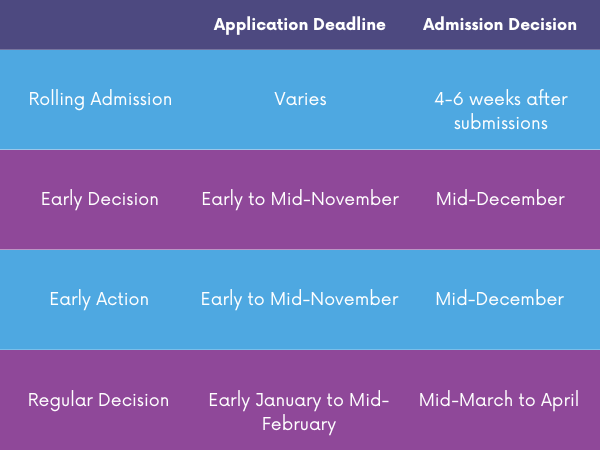
Your high school journey is wrapping up and you are entering the exciting process of college applications and admissions decisions. During the college application process, you will submit essays, transcripts, recommendations, and academic resumes to several colleges and universities, where admissions counselors will review them. If you are anything like other high school students applying to colleges across the United States, you might wonder what makes your application more likely to catch the eye of admissions counselors. We talked to Kylie Dickerson, an undergraduate admission counselor at Fontbonne University, and she shared 4 important tips to make your college application stand out.
Tip No. 1: Get your application in early.
The first step to making an application stand out is getting it in on time and for the best results, early. “Getting your application in early shows great time management and dedication,” said Dickerson. “It shows admissions counselors that you are hardworking and do not procrastinate, making you a great fit for their school.”
There are other benefits to getting your application in early. Dickerson shared that some schools, including Fontbonne, have a timeline for special scholarships.
A key part of getting your application in early is understanding the admission cycle and common deadlines for schools. There are four most common college application deadlines: Early decision, early action, regular decision, and rolling admission. Understanding where your college of interest falls in the admissions cycle can help you plan out your application accordingly.

Rolling admissions, like at Fontbonne University, means they review applications all the time, not just at specific deadlines – giving you the advantage of flexibility. Deadlines vary from school to school, some are from December to April, while others keep going until all spots are filled. Some schools have a priority admission window. Fontbonne has a priority admission period from July 1 to January 31, a special time when applying gets you extra attention. After that, regular decisions start in February, offering a more relaxed timeline for applying.
Early decision deadlines let students apply and get their admission decision before the regular deadline. If you’re accepted through early decision, it means you must attend that college – it’s binding. Students should only choose one school for early decision. Ensure your application materials and essays are ready well in advance if you opt for an early decision application.
Early action deadlines enable students to apply and receive their admission decision ahead of the regular application deadline. Unlike early decision, early action is non-binding, allowing students the flexibility to consider other college options. You can apply to multiple schools under early action. It’s advisable to have your application materials and essays prepared well in advance to meet the early action deadline and increase your chances of a prompt decision.
Regular decision deadlines mark the standard timeframe for submitting college applications. Unlike early decision or early action, regular decision is non-binding, giving students the freedom to apply to multiple colleges and compare offers. You have until the specified deadline to submit your application materials and essays. It provides a more flexible option for those who want to take their time in the application process and carefully consider their college choices.
Tip No. 2: Tell your full story
If your grades are not at the highest percentile, you might still have a chance of getting into a top college of your choice. Admission counselors look to more than just your grades to see if you will be a good fit for their incoming classes. Your transcripts, college essays, and other supplementary application materials like resumes tell the full story of your high school.
“Lots of students have complex educational histories; it could boost your chances to include resumes and personal statements that help give context to your high school experiences,” Dickerson explained. “I also look for students who have made marked improvements throughout high school. Maybe they struggled a bit their freshman year, but now in their senior year, their D’s have become C’s or B’s, their C’s have become B’s and A’s, etc. I think this shows diligence and a willingness to work hard for success.” At Fontbonne, prospective students with a 3.0+ GPA – demonstrating a strong academic background are automatically admitted. Students with a GPA between 2.0 and 2.9 will fall under holistic review where additional application materials may be reviewed to determine your application status.
Tip No. 3: Make specific connections
Making specific connections at your desired college can help make your application stand out against hundreds of applications admissions counselors may receive. “Reaching out to athletics or academic deans can make you very memorable, in turn giving your application a boost,” Dickerson advised. “If you are an athlete, reaching out to coaches of sports you are interested in can give you someone in your corner and help your application stand out. Connecting with professors or academic deans to ask questions about your specific academic interests shows initiative and lets colleges know you are ready to work hard.”
You could find a college connection by writing emails to coaches, professors, or academic deans stating your desired interest in their school and what you would like to study. Having clear interest and questions about the available academic and athletic programs will give direction to your interactions with your college connection.
Having more than one specific connection at a college of your choice can make for strong chances with your application. Showing the people at a college that you are excited to work with them gives a stronger impression of your overall application.
You can make specific connections at Fontbonne by exploring our faculty and staff directory or reaching out to our admissions staff.
Tip No. 4: Go to open houses
Attending a college open house can show a demonstrated interest in the institution, and some colleges take that into account when considering applicants. Attending open houses demonstrates your interest in attending that college. An application that shows you understand a college’s culture, and values and that they align with yours. Being able to speak with real people at a college open house– including current students and professors can help you make an informed decision about college and give you an edge for your application materials.
“When you come to open houses, you can learn what makes that college your top choice,” Dickerson shared. “Then you are better able to reflect that in your application and stand out to the admissions counselors who review it. Open houses are an underutilized strategy for college applications.”
If your college of interest is too far away to visit, you might be able to attend virtual tours of the campus. A virtual tour can offer you the ability to connect with admissions counselors and student ambassadors while letting you demonstrate a vested interest in the school from the comfort of your home.
Fontbonne University hosts open houses and visits throughout the year, to learn more about our open house events, Saturday tours, and virtual visits, visit us at Fontbonne.edu.

